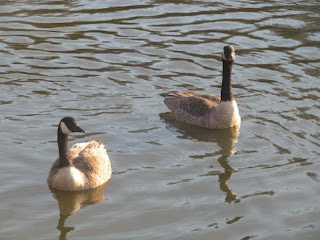The winter of 2017 might well be the winter that wasn't -- at least in New York City.
Temperatures have averaged five to ten degrees above normal for most of the past three months and Central Park lakes and ponds have remained open water for virtually all but a few days.
Such favorable circumstance has obviously benefited the many hundreds of migratory geese and ducks wintering in Central Park this year. If the number of geese, shovelers, mallards, coots and assorted diving ducks has been exceptionally high, it's because they have been able to utilize the other, shallower watercourses in the park and not just the Reservoir. Moreover, what little snow fell this winter in NYC, was quickly melted away within days as temperatures sometimes rose as high as 60 degrees.
For those of us who monitor and sometimes help feed, wintering birds, such "easy season" is relief. To my knowledge, no waterbirds were lost to starvation in Central Park this winter as has occurred in the past. All appeared to be healthy, robust and more than capable of withstanding the few storms, frozen watercourses and "bitter blasts" that occurred.
Even the few domestic, flightless ducks (abandoned on park lakes) were mostly spared this winter of having to scrounge out survival in tiny pools of water on otherwise frozen ponds and lakes. Whatever icing occurred thankfully did not cover entire lakes, nor did it last more than a week. The Indian Runner duck (whom I named, "Jody") at Harlem Meer and the two domestics at the CP Boat Lake, not only have survived this winter, but to this point, appear to be thriving.
But if this easy winter has been relief (for the animals and New Yorkers), it is also disquieting in terms of concern for global warming.
Last year was the warmest world wide on record and that trend has been in place for some years now. Add to that, record-breaking droughts and/or floods occurring in many parts of the world and the science and concerns are very real.
Unfortunately, we now have a President and administration that denies evidence of climate change and is in the process of dismantling the EPA.
I am not a scientist and cannot say with any certainty that early departures of migratory geese and early returns of nesters means anything. But perhaps in combination with other happenings around the world, they do. Especially when one considers the interconnectedness of virtually everything in life and everything on the planet. http://www.slate.com/articles/business/metropolis/2017/03/cities_are_throwing_out_climate_change_in_favor_of_resilience.html?wpsrc=sh_all_mob_fb_top
Perhaps in the long run, we have to hope that the small and seemingly innocuous changes we are observing in nature aren't actually akin to the "canary in the coal mine" scenarios we grew up hearing about.
As easy and relieving this winter has been in New York City, I can't help but feel some sense of disquiet and unease.
We have to hope it isn't the perennial, "calm before the storm," but I fear it might be. -- PCA
**********
**********









No comments:
Post a Comment